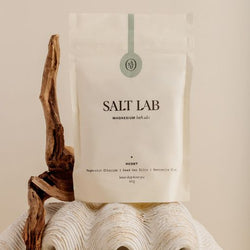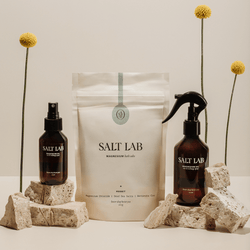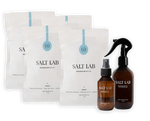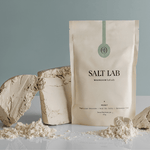In today's fast-paced world, stress has become a force impacting millions worldwide. From looming deadlines to personal pressures, the weight of stress can feel overwhelming at times. At the centre of our body's response to stress is cortisol, often termed the "stress hormone." This powerful chemical messenger, secreted by the adrenal glands, orchestrates various physiological responses to stressors, affecting everything from heart rate to immune function. Magnesium, a vital mineral found abundantly in the body, emerges as a key player in modulating cortisol levels and promoting relaxation. As we delve deeper into the connection between magnesium and cortisol, we uncover how magnesium supplementation can offer a natural approach to managing stress and restoring balance to our lives.
Understanding Cortisol
Cortisol, the primary hormone involved in the body's stress response, serves as a double-edged sword. In acute situations, it mobilises energy reserves, sharpens focus, and enhances survival instincts. However, chronic stress can disrupt this delicate balance, leading to persistently elevated cortisol levels. Over time, this can wreak havoc on our health, contributing to a host of issues such as anxiety, depression, and metabolic disturbances.
As the body's natural alarm system, cortisol plays a crucial role in helping us navigate life's challenges. Yet, when left unchecked, chronic stress can trigger a cascade of negative effects, underscoring the importance of stress management strategies and self-care practices. Understanding the intricate interplay between cortisol and stress is essential for maintaining optimal health and well-being in today's fast-paced world.
In addition to its role as the body's primary stress hormone, cortisol serves as a vital regulator of numerous physiological processes beyond the stress response. It plays a crucial role in regulating metabolism, controlling blood sugar levels, and supporting immune function. During times of acute stress, cortisol mobilises energy reserves by increasing glucose availability in the bloodstream, providing the body with the fuel it needs to respond to perceived threats.
However, chronic stress can disrupt this delicate balance, leading to persistently elevated cortisol levels. Prolonged exposure to high cortisol levels can have detrimental effects on various organ systems, contributing to a range of health issues such as hypertension, insulin resistance, and immune suppression.

How Does Magnesium Impact Cortisol Levels?
Magnesium, often celebrated as nature's relaxation mineral, is intricately linked to the body's stress response system. This essential mineral, abundantly present in the body, plays a pivotal role in modulating cortisol levels, the primary hormone involved in the stress response. Understanding the mechanisms by which magnesium influences cortisol levels sheds light on its potential role in stress management and promoting relaxation.
At the core of magnesium's impact on cortisol levels lies its ability to regulate the hypothalamic-pituitary-adrenal (HPA) axis, the central control system for the body's stress response. By acting as a natural antagonist to cortisol, magnesium helps restore balance to the stress response system, preventing excessive cortisol production and mitigating the effects of chronic stress. Through its influence on enzymes involved in cortisol metabolism, magnesium helps regulate cortisol levels and modulate the body's response to stressors.
Magnesium's impact on cortisol levels extends beyond its direct effects on the HPA axis. It also modulates neurotransmitter pathways involved in stress and anxiety regulation, such as the gamma-aminobutyric acid (GABA) system. By facilitating the binding of GABA to its receptors, magnesium enhances its calming effects and reduces the activity of stress-responsive brain regions.
Magnesium Deficiency and Stress
Magnesium deficiency poses a significant concern in contemporary society, often arising from inadequate dietary intake and lifestyle factors. This deficiency exacerbates the body's stress response, amplifying cortisol levels and elevating vulnerability to stress-related ailments.
Chronic stress compounds magnesium depletion, initiating a cycle of stress-induced magnesium loss. Elevated cortisol levels prompt increased magnesium excretion via urine, perpetuating stress and magnesium deficiency.
Identifying signs of magnesium deficiency—such as muscle cramps, fatigue, and irritability—is pivotal for rectifying underlying imbalances and optimising well-being.
In essence, magnesium deficiency amplifies the body's stress reactivity, heightening cortisol levels and susceptibility to stress-related ailments. By addressing magnesium insufficiency through dietary adjustments or supplementation, individuals can bolster their capacity to confront stress and foster holistic well-being.

Stress Management and Relaxation
Effectively managing stress is paramount for maintaining overall well-being and promoting relaxation in today's fast-paced world. Incorporating stress management techniques into daily life can help mitigate the negative effects of chronic stress, fostering a sense of calm and balance.
Regular exercise is one of the most effective ways to reduce stress and promote relaxation. Physical activity helps release endorphins, the body's natural mood elevators, while also providing an outlet for pent-up tension and anxiety. Whether it's going for a brisk walk, practising yoga, or engaging in strength training, finding an exercise routine that suits your preferences can significantly enhance stress resilience.
Mindfulness and meditation techniques offer powerful tools for managing stress and promoting relaxation. Mindfulness practices encourage present-moment awareness, allowing individuals to observe their thoughts and emotions without judgement. By cultivating mindfulness, individuals can develop greater resilience to stress and cultivate a sense of inner peace and tranquillity.
Incorporating magnesium supplements such as our bath salts can offer a natural and effective solution. Magnesium plays a crucial role in modulating cortisol levels and promoting relaxation. Supplementing with magnesium bath salts provides a convenient and indulgent way to replenish magnesium levels and support the body's stress response system. Magnesium is readily absorbed through the skin, making magnesium baths an efficient method for delivering this essential mineral directly to the body's cells.
Understanding the intricate relationship between cortisol, stress, and magnesium unveils a pathway towards holistic well-being. Through its role in modulating cortisol levels and promoting relaxation, magnesium emerges as a powerful ally in the pursuit of stress management and balance. By incorporating stress management techniques, such as exercise and mindfulness, alongside magnesium supplementation like our bath salts, individuals equip themselves with potent tools to navigate life's stresses and embrace a life of tranquillity and vitality.
















